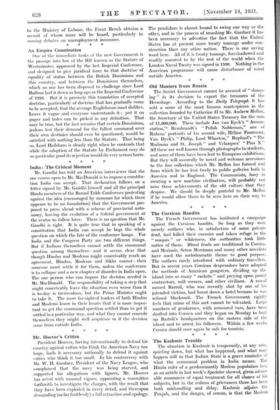India : The Critical Moment Mr. Gandhi has told an
American interviewer that the one course open to Mr. MacDonald is to impose a constitu- tion India can accept. That declaration follows on a letter signed by Mr. Gandhi himself and all the principal Hindu members of the Round Table Conference protesting against the idea (encouraged by rumours for which there appears to be no foundation) that the Government pro- posed to press ahead with a scheme of provincial auto- nomy, leaving the evolution of a federal government at the centre to follow later. There is no question that Mr. Gandhi is right. It is quite true that in speaking of a constitution that India can accept he begs the whole question on which the fate of the conference hangs. For India and the Congress Party are two different things. But if Indians themselves cannot settle the communal question among themselves—and it seems clear that though Hindus and Moslems might conceivably reach an agreement, Hindus, Moslems and Sikhs cannot—then someone must settle it for them, unless the conference is to collapse and a new chapter of disorder in India open. The one person who can impose the decision needed is Mr. MacDonald. The responsibility of taking a step that might conceivably leave the situation even worse than it is to-day is tremendous, but the Prime Minister ought to take it. The more far-sighted leaders of both Hindus and Moslems know in their hearts that it is more impor- tant to get the communal question settled than to get it settled in a particular way, and what they cannot concede themselves they might well acquiesce in if the decision came from outside India.


































 Previous page
Previous page